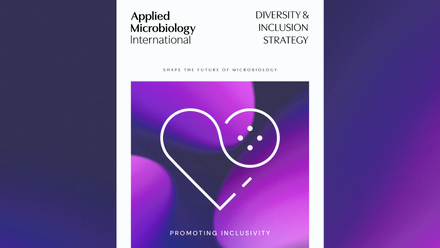‘Green’ jobs and roles in emerging STEM industries are not accessible to all, says AMI-sponsored report

A new report looking at the distribution of STEM skills across the UK has found that roles in new and emerging STEM industries are disproportionately concentrated in London and the South East.
The All-Party Parliamentary Group (APPG) on Diversity & Inclusion in STEM - whose work is supported by Applied Microbiology International - has published its latest report on regional STEM skills inequity. This is the Group’s third report investigating inequity in STEM, following inquiries into education and the workforce.
The report also found a correlation between the uptake of STEM further education courses and deprivation in an area. The UK’s most deprived constituencies typically exhibit three times the take-up of STEM further education courses than the least deprived constituencies.
It warns that existing inequities in access to STEM jobs will perpetuate inequities in and into STEM. The APPG calls for sector leaders and Government to work together to improve regional equity in access to STEM pathways, particularly innovation clusters, low-carbon industries and critical technologies.
Picture of STEM skills
The report used publicly available data to create a picture of STEM skills by constituency across the UK. The British Science Association (BSA), who provides the secretariat for the APPG, commissioned economics research firm, London Economics, to conduct the research and initial analysis.
The research looked at the demographic make-up of constituencies against the provision of STEM skills, as well as the presence of STEM graduates, higher education and further education institutions, and STEM industry.
Post-industrial areas
The report found that post-industrial areas maintain an above average level of STEM jobs compared to the rest of the country. However, this also correlated with higher levels of deprivation as measured by the Index of Multiple Deprivation (IMD).
Despite industries such as mining and manufacturing declining over the past few decades, the areas in which the industries once thrived continue to generate relatively high numbers of STEM jobs. Middlesbrough, for example, has 24,442 STEM jobs compared to the national average of 17,234 (these figures are adjusted for population). However, in spite of this, it is also one of the most deprived constituencies in England.
The Government’s agenda to make the UK a ‘science superpower’ is part of its plan for economic growth – yet on a local level, the presence of more traditional science, technology, engineering and maths industries does not necessarily equate to economic prosperity for communities.
Newer STEM industries
Newer STEM industries on the other hand, such as biomedical science, data science, software engineering as well as those contributing to the UK’s net zero ambitions like low-carbon consultancy and alternative fuels, tend to be concentrated in areas where there are already high levels of economic activity, such as London, Cambridge, Manchester and Bristol.
Contributing to this is the presence of university spinouts (enterprises evolving from pioneering university research and innovation) with Manchester and the City of Bristol experiencing the most growth proportionally.
As a result, there are significantly higher costs of living around the areas where companies in those sectors are based, pricing out people who may want to work in these industries but live elsewhere in the country.
There is therefore a risk that the existing unequal distribution of STEM jobs – whereby regions of industrial decline since the 1960s and 1970s can’t play a part in the modern STEM landscape, and areas such as the South East continue flourishing – is exacerbated.
STEM jobs in areas with ‘newer’ STEM industry correlated with lower levels of deprivation. The importance of “soft infrastructure” (management expertise and venture capitalists, for instance) is also highlighted, as it clusters in areas of high innovation, such as in the vicinities of top research institutions in Cambridge and London.
Further education patterns
Additionally, the report found a strong relationship between deprivation and the take-up of different further education routes, with the most deprived constituencies typically having three times the take-up of STEM further education courses than the least deprived constituencies.
Where there are high levels of deprivation, and likely years of industrial decline too, the appetite to obtain skills in STEM and progress into a STEM job is apparent. Whether this is for individuals to prepare for existing jobs or jobs in ‘newer’ STEM industries is unclear.
However further education providers, STEM employers and industry, and particularly government must take note of this demand and support individuals and communities in reaching their STEM goals.
Key drivers
Further education providers could therefore play an important role in areas with ‘older’ STEM industries, teaching skills required for ‘green’ jobs and driving the net zero agenda in areas where the low carbon economy is less developed.
It’s also worth noting that a 2021 report from the Association of Colleges suggests that the further education sector “lags behind the Commercial sector in engaging with equality, diversity and inclusion (EDI)” (Association of Colleges, 2021). The Association goes on to recommend that EDI should be addressed at Board level of further education colleges.
More investment and support from the Government, as well as industry, are needed in order for further education and technical colleges to be successful in: responding to local demand; transitioning workers to ‘newer’ STEM jobs in the economy; and setting up EDI frameworks to ensure learners and staff from minoritised groups are fully supported.
Distribution of STEM skills
Chi Onwurah, Chair of the APPG on Diversity & Inclusion in STEM, says: “The latest report from the APPG on Diversity & Inclusion in STEM examines geography in addition to gender, economic disadvantage, and ethnicity when examining inequity in STEM skills and careers”
“The APPG’s analysis and findings can help improve Government’s understanding of how STEM skills are distributed and help establish measures which enable diverse people and places to be enriched by the benefits that STEM skills and opportunities can bring, both individually and on a regional level.”
The views expressed in this report are those of the All-Party Parliamentary Group on Diversity and Inclusion in STEM. The report does not necessarily represent the views of any of the sponsors, witnesses, contributors and re-viewers, unless stated.
The full report is available at https://www.britishscienceassociation.org/regional-stem-skills-inequity
Find out more about the APPG via www.britishscienceassociation.org/appg.



